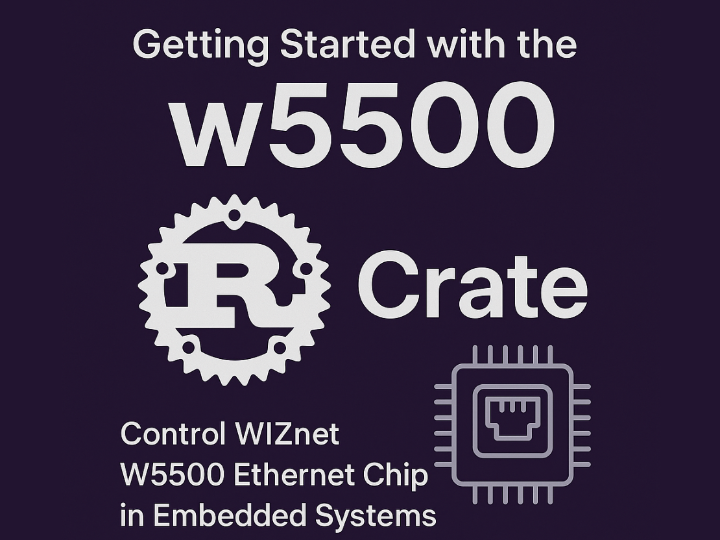Getting Started with the w5500 Rust Crate: Control WIZnet W5500 Ethernet Chip in Embedded Systems
Getting Started with the w5500 Rust Crate: Control WIZnet W5500 Ethernet Chip in Embedded Systems

🧠 Getting Started with the w5500 Rust Crate: Control WIZnet W5500 Ethernet Chip in Embedded Systems
Are you building an embedded system that requires stable Ethernet connectivity? Do you want to write firmware in Rust and control the WIZnet W5500 Ethernet chip through SPI?
The w5500 Rust crate is the perfect starting point.
In this article, you'll learn what this crate does, how it works, and how to integrate it into your embedded Rust project.
🔍 What is the w5500 Crate?
The w5500 crate provides a low-level register interface for the WIZnet W5500 Ethernet controller chip.
It allows developers to communicate with the W5500 over SPI from any MCU that supports Rust and the embedded-hal abstraction.
It’s designed for no_std environments, making it ideal for bare-metal embedded applications.
✨ Key Features
- ✅ Full Register Access: Configure IP, MAC, subnet, sockets, and control W5500 directly.
- ✅
embedded-halCompatible: Works seamlessly with SPI and GPIO abstractions across many MCU platforms. - ✅ No-std Support: Perfect for constrained environments with no operating system.
- ✅ Flexible SPI Modes: Supports both normal and burst SPI transfers.
- ✅ Composable: Easily used with high-level libraries like
w5500-hlorw5500-mqtt.
🛠 Example: Configure IP Address via SPI
Here’s a basic example of how to use the crate to configure the W5500’s gateway and subnet:
use w5500::W5500;
use embedded_hal::blocking::spi::Transfer;
use embedded_hal::digital::v2::OutputPin;
let mut w5500 = W5500::new(spi, chip_select);
w5500.set_gateway(&mut spi, &mut chip_select, &Ipv4Addr::new(192, 168, 0, 1))?;
w5500.set_subnet(&mut spi, &mut chip_select, &Ipv4Addr::new(255, 255, 255, 0))?;
This lets your Rust firmware talk to the outside world via Ethernet — no C code, no unsafe hacks.
🚀 Use Cases
The w5500 crate is ideal for:
- 🌐 IoT devices with Ethernet (smart sensors, controllers)
- 🧰 Industrial automation systems needing reliable wired communication
- 📡 MQTT-over-Ethernet endpoints in low-power or real-time networks
- 🔒 Security-focused edge devices with Rust’s memory safety
📦 Why Use Rust for Embedded Networking?
Rust is becoming the go-to language for modern embedded development thanks to:
- 🛡️ Memory safety without garbage collection
- 🚀 High performance on microcontrollers
- 🧩 Composable, reusable crates and HALs
- 📚 Growing ecosystem for
no_stddevelopment
Combining Rust with a hardware TCP/IP stack like W5500 allows you to build secure and deterministic embedded network devices with far fewer bugs and race conditions.
🔗 Learn More
✅ Conclusion
If you're developing a Rust-based embedded application and need Ethernet support via the WIZnet W5500, the w5500 crate is a must-have.
It brings hardware-level control in a safe and ergonomic Rust interface, enabling high-performance networking on MCUs.
Start your journey into embedded Ethernet with Rust today.
Safe, fast, and future-proof.
